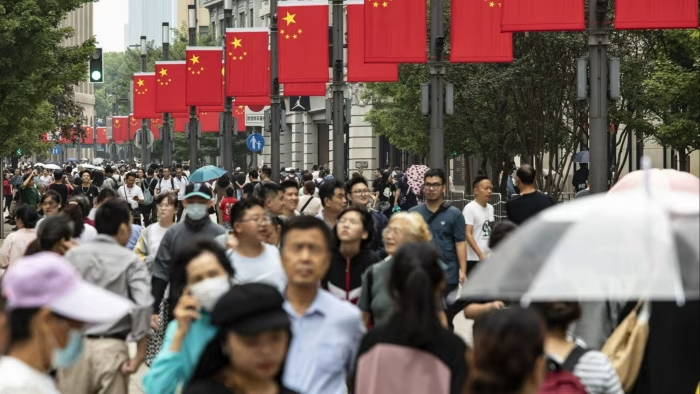Chinese economy impacted post fiscal year 2024 as the country faces slower growth, structural challenges, and a property market downturn, raising concerns about its future economic prospects. According to the National Bureau of Statistics, China’s gross domestic product (GDP) grew by 4.6% in the third quarter of 2024, the slowest pace since early 2023. This figure falls short of the government’s target of “around 5%” annual growth and indicates ongoing difficulties in revitalizing the world’s second-largest economy.
Slower Economic Growth and Missed Targets
The Chinese economy impacted post fiscal year 2024 has seen its official growth measure fall below expectations for two consecutive quarters, leading to fears that the government may not meet its 2024 growth target. While the 4.6% GDP increase slightly surpassed analysts’ expectations, it remained below the desired 5% threshold, signaling deeper economic struggles. Eswar Prasad, the former head of the International Monetary Fund’s China division, stated that “the government’s growth target for this year now appears in serious jeopardy.”
China has launched various stimulus measures in recent months to bolster the economy. However, despite these efforts, growth has remained weak, with economists suggesting that more aggressive intervention may be necessary to meet the year-end goals.
Property Market Crisis and Its Impact
One of the most significant factors dragging down the economy is the struggling property market. Chinese economy impacted post fiscal year 2024 has been largely attributed to the downturn in the real estate sector, with new home prices falling at the fastest rate in nearly a decade during September. Property investment has remained sluggish, and industry experts predict that the market will continue to weigh on the broader economy until prices stabilize and housing inventories decrease.
Lynn Song, chief economist for greater China at ING, explained, “The property market unsurprisingly remains the biggest drag on China’s growth.” She added that the sector is unlikely to see a substantial recovery in investment until housing prices begin to rise and inventory levels shrink. As a result, the property market continues to pose a major obstacle to achieving sustainable economic growth.
Stimulus Measures and Government Response
To address the growing challenges, the Chinese government has introduced a series of stimulus packages. The People’s Bank of China (PBOC) has rolled out the largest economic support plan since the COVID-19 pandemic, including cuts to interest rates and mortgage rates to encourage spending and investment. Additionally, the Ministry of Finance and other government institutions have announced further plans to help stabilize the stock market and increase lending to businesses and individuals.
Despite these efforts, Chinese economy impacted post fiscal year 2024 remains a critical concern for both domestic and international observers. Moody’s Analytics economist Harry Murphy Cruise expressed cautious optimism, noting that the stimulus measures could help the country meet its “around 5%” growth target for the year. However, Cruise warned that “more is required if officials are to address the structural challenges in the economy.”
Structural Challenges and Consumer Confidence
Beyond the property market, Chinese economy impacted post fiscal year 2024 has been influenced by weak consumer and business confidence. In the aftermath of the pandemic, many consumers remain hesitant to spend, and businesses are reluctant to invest amid the uncertain economic outlook. While the government’s stimulus measures have provided temporary relief, they have yet to generate the widespread confidence needed to drive a more robust economic recovery.
Further complicating the situation is China’s significant debt load, particularly among local governments and state-owned enterprises. These structural issues require long-term solutions that go beyond short-term stimulus efforts, and many experts believe that more fundamental economic reforms will be needed to ensure sustained growth.
Global Implications
As Chinese economy impacted post fiscal year 2024, the repercussions are being felt worldwide. China’s economic performance is critical to global markets, particularly in sectors such as manufacturing, trade, and real estate. The slowdown in China has raised concerns about the potential for reduced demand for global commodities and exports, which could have ripple effects on economies that rely heavily on trade with China.
Additionally, China’s economic challenges are influencing investor sentiment, with uncertainty about the country’s recovery contributing to fluctuations in global stock markets. The international community is closely monitoring the situation as China’s economic health remains a key factor in the stability of the global economy.
Conclusion
Chinese economy impacted post fiscal year 2024 highlights the growing challenges facing the country as it struggles to meet its growth targets. The property market crisis, weak consumer confidence, and structural economic issues are all contributing to the slower-than-expected recovery. While government stimulus measures have provided some relief, experts agree that more needs to be done to address the underlying challenges. With the global economy also feeling the effects of China’s slowdown, the world is watching closely to see how Beijing navigates this critical period in its economic development.
Stay connected to know more on arcnews.online for global news like Chinese Economy Impacted Post Fiscal Year 2024. For videos updates visit our YouTube. Do subscribe to Arcnews to get latest updates directly in your mail box.
Have A Great Day.


